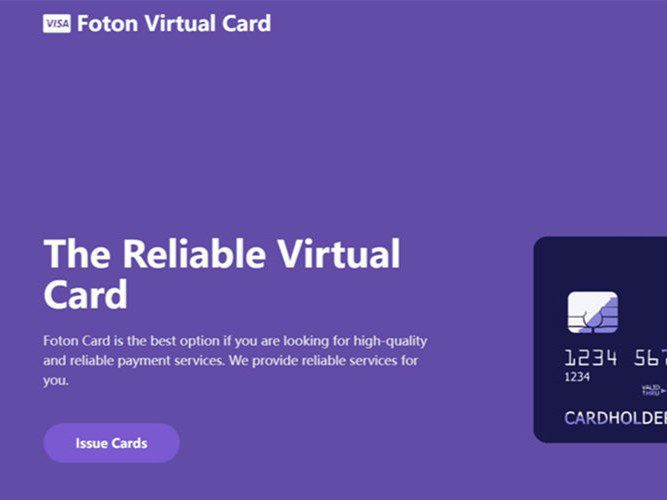Official website address:https://fotoncard.com/

In cross-border e-commerce, overseas advertising and other business scenarios, virtual credit card has become an important tool due to its convenience and security. This article introduces the core functions and operation points of Foton virtual credit card platform for foreign trade and cross-border industry practitioners with practical experience.
I. Basic functions of the platform and registration process
Foton platform mainly focuses on USDT deposit virtual card services, support VISA card segment, registration process is simple: only need mailbox (does not support the Microsoft system mailbox), verification code and password to complete the registration, without KYC authentication. The platform adopts the invitation system, you need to fill in the invitation code (e.g. 280053) when registering. New users can initially create 3 virtual cards, and then contact customer service to apply for an increase in the number.
II. Deposit modalities and fee structure
- Deposit Channels
Both USDT (TRC20 chain) and bank wire transfer are supported.Recommended USDT DepositsFor example, if you recharge 1 USDT, the handling fee is 1.5% (e.g. recharge 100 USDT, the account will arrive at 98.5 USD). Bank wire transfer takes 2-3 days to arrive at the account, the timeliness is lower. - Card Opening Costs
Opening fee is 2 USD/card, minimum initial balance is 20 USD, total cost of single card starts from 22.7 USD. Card segments are abundant, with 11 available BINs (e.g. 556766, 222929, etc.), and some of the segments used to support Wise activation (some of them are now restricted, so you need to test them in advance).
III. Usage Scenarios and Operational Recommendations
- Core Scenarios
- Cross-border e-commerce platform debit (monthly payments from Amazon, Shopify, Shrimpp, etc.);
- Overseas advertising placement (Google Ads, Facebook Ads, TikTok Ads, etc.);
- Subscription services (Nifty, Oracle Cloud, PayPal bundles in the US, etc.).
- Fees and Risk Warning
- Failed authorization costs: 0.2 USD is charged for each failed order after the failure rate exceeds 20%;
- Cross-border Handling FeeFor non-USD transactions or non-Metro merchants, the charge is based on "Amount x 2% + 0.3 USD";
- Margin Policy: New users after July 2023 will be required to pay a deposit of 100 USD (refundable after 45 days), and it is recommended that the initial top-up is no less than 150 USD to cover costs.
IV. User experience and comparative advantages
- anonymity: No authentication is required, privacy is protected, and it is suitable for KYC-sensitive scenarios;
- dexterity: Supports customization of cardholder name, billing address, and adapts to multi-platform validation requirements;
- limitationsOnly support USDT recharge, single function; some card segments have unstable support for Wise activation, need to confirm in advance.
Compared with similar platforms (e.g. Uniwise, PokePay), Foton's advantages are zero KYC threshold and instant USDT deposit, which is suitable for small and medium-sized high-frequency cross-border payment scenarios, but need to pay attention to the fee structure and the applicability of card segments.
V. Operational recommendations
- New users can start small to test card segment compatibility (e.g. 222934, 557271, etc.);
- Recharge as you go, avoiding funds being held up for long periods of time;
- Regularly monitor the card decline rate and maintain it below 20% to avoid additional fees.
For cross-border practitioners who need to open cards quickly and emphasize on privacy protection, the Foton virtual credit card platform can be one of the alternative tools to be used flexibly in conjunction with business scenarios.












